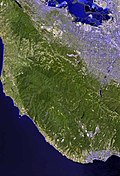Zayante Creek
| Zayante Creek | |
|---|---|
| Native name | Sayant (Awaswas language)[2] |
| Location | |
| Country | United States |
| State | California |
| County | Santa Cruz |
| Physical characteristics | |
| Source | Santa Cruz Mountains |
| • location | Castle Rock Ridge[1] |
| • coordinates | 37°9′21.81″N 122°0′4.85″W / 37.1560583°N 122.0013472°W[1] |
| • elevation | 1,000 ft (300 m) |
| Mouth | San Lorenzo River |
• location | Felton |
• coordinates | 37°2′52.82″N 122°4′4.87″W / 37.0480056°N 122.0680194°W[1] |
• elevation | 233 ft (71 m)[1] |
| Length | 10.3 mi (16.6 km)[1] |
| Basin features | |
| River system | San Lorenzo River |
| Tributaries | |
| • left | Mountain Charlie Gulch, Bean Creek |
| • right | Lompico Creek |
Zayante Creek (Ohlone: Sayant) is a 10.3-mile-long (16.6 km) stream within the San Lorenzo River watershed in Santa Cruz County, California, United States. The U.S. government has designated Zayante Creek as impaired with respect to sediment.[3] Lompico Creek, a tributary of Zayante Creek, is listed for impairment by pathogens.[4] In the period 1998 to 2000 a restoration project was conducted for this stream to improve anadromous fish passage, rearing and spawning.[5] There has been a permanent U.S. Geological Survey gauging station on Zayante Creek which has operated since the year 1959; the mean altitude of the Zayante Basin, carved within the western slopes of the Santa Cruz Mountains, is 1,000 feet (300 m).[6] Significant tributaries to Zayante Creek are Lompico Creek and Bean Creek.
Geology
[edit]Soils formations along the mainstem of Zayante Creek by ascending altitude are: Monterey Formation, Zayante Formation, Vaqueros Sandstone and Lompico Sandstone;[7] about midway through its course, Zayante Creek is bisected by the Zayante Fault.
Ecology
[edit]Several notable ecological features are present in the Zayante Creek watershed, including the occurrence of a rare forest type: maritime coast range ponderosa pine forest, which contains two endangered arthropods. Regarding specific avafauna species there are sightings of Townsend's warbler.[8]
See also
[edit]References
[edit]- ^ a b c d e U.S. Geological Survey Geographic Names Information System: Zayante Creek
- ^ Santa Cruz Mountain Bulletin - The Sayant and Achistaca
- ^ Federal impairment classification for Zayante Creek
- ^ Central Coast Regional Water Quality Control Board: Impairment Listing for Lompico Creek (2006)
- ^ State of California Zayante Creek Restoration Project
- ^ U.S. Geological Survey Stream Gauge Summary
- ^ C. Michael Hogan, Leda Patmore, David Crimp et al., San Lorenzo Basin Groundwater Recharge and Water Quality Study, Earth Metrics Incorporated, Association of Monterey Bay Area Governments, July 7, 1978
- ^ David Suddjian, Santa Cruz Birds, Albatross, March/April 1993 (Vol 38, No. 4)


